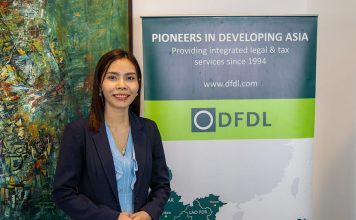
The real estate market in Cambodia, and particularly in Phnom Penh, is growing at a breakneck speed and attracting hefty amounts of investment. According to the US-based real estate services firm CBRE, the capital’s property market saw a broad rise in sales and rental values over the last quarter of 2015.
In a market expanding as rapidly and hectically as Phnom Penh, regulations, oversight, and standards of practice can sometimes lag behind, creating an environment that may be less than ideal for your investment. To help you avoid the major pitfalls of investing in the city’s property sector, the B2B team sits down with leading real estate professionals to find the key points to consider before making a property investment in the Kingdom.
Land titles
Land titles are the first subject to come up when we ask our collaborators for advice; in the words of Nigel Doughan, Commercial Leasing Manager at International Property Services – better known as IPS – in Phnom Penh: “The number one most important thing is the title on the property.”

When it comes to titling property, Cambodia uses a multi-tiered system, with different land titles that hold different levels of authority, and hence security. The main difference between them are the level of government at which your property is registered.
Soft titles are the most common form of ownership in the Kingdom. They are issued by the local Sangkat (commune) or Khan (district) office, and, as such, are not registered at the national level, which makes them less secure. However, most property transactions in Cambodia are still carried out with soft titles, partially because they allow those involved to avoid ownership taxes and related fees. It is still, however, illegal for foreigners to purchase soft title properties under their own name, according to Doughan.
A hard title is the strongest form of property ownership available in the Kingdom. Hard titles are recognised at the national level and certified by the Ministry of Land Management, Urban Planning and Construction. When a transaction is conducted with a hard title, a transfer tax of 4% applies, and additional fees may be payable to the land office.
Strata titles are the newest form of ownership and the only ones that allow foreigners to legally own property. They came into being as the product of the “Law on Foreign Ownership” which came into force in 2010. Under the law, foreigners may directly own units within co-owned buildings (otherwise known as condominiums), excluding the ground floor. Foreign ownership also must not exceed 70% of the total value of the property.
Land Management and Administration Project (LMAP) titles are another option. LMAP is a titling system launched in Cambodia with the help of the World Bank to help implement a systematic registration system and secure the land tenure of untitled Cambodians. “An LMAP title gives you the exact coordinates and ensures peace of mind for the buyer,” says Doughan. “Properties held at the national level, with hard or LMAP titles, are the most detailed and accurate forms of ownership,” he says.
Simon Griffiths, Associate Director at CBRE Cambodia, asserts that “there is no one size fits all” when it comes to titles, believing that different situations warrant different strategies. Although he acknowledges there are benefits to soft titles, he recommends would-be investors to play it safe and opt for hard or LMAP titles if given the choice.

Other considerations: location and rental yields
Location is another key point brought up by our collaborators. Doughan recommends to look for property in strong growth areas. The prime residential districts of Chamkarmon, Daun Penh, 7 Makara and Toul Kork are some of the areas in the capital experiencing the most dramatic growth in development projects. However, according to CBRE’s latest report, a number of alternative locations, such as Chroy Chang Va and Sen Sok, are quickly gaining ground and accounted for 15% of total condominiums units announced in 2015.
Doughan also advises investors to consider rental yields If they are buying a tenanted property for an investment. Fortunately, the city enjoys high rental returns. According to the Numbeo.com, a database of data on cities around the world, the gross rental yield in Phnom Penh centre averages 8.5%, while outside of the centre can reach 10%; in this regard, the Cambodian capital outperforms more developed areas of the world like Taipei, Singapore and Hong Kong.
Frequent pitfalls
Recurrent mistakes made by investors include buying properties that have the wrong type of title. Doughan cautions investors against directly acquiring soft titles: “Many foreigners have recently purchased soft title properties under their own names. This is still illegal in the Kingdom,” he explains. “Unlike new strata titled properties, which can be legally bought by foreigners, older dwellings cannot legally be purchased under a foreigner’s name.”
According to CBRE’s Griffiths, there are other topics which are often dismissed or brushed over by investors, causing unwelcomed surprises. They include the tax implications of land and property ownership and the restrictions to foreign ownership of land and property.
The due diligence process
Conducting proper due diligence is paramount to the success of your investment; in the words of Thida Ann, Senior Associate Director at CBRE Cambodia: “Research and consultancy can help investors understand the market and the impact of their projects before they make the investment. Having the right product, the right location, the right timing, the right scale, the right design and the right price are all key elements for success.”

To begin the process of due diligence, Griffiths recommends would-be investors first get a feel for the legal framework in the country. For this, investors can do some basic online research of their own. “There is good material out there from CBRE and other [property] firms, as well as from different law firms,” Griffiths says.
Initial research can be followed up by arranging a meeting with a real estate or a legal advisory firm, who will be able to deepen your understanding of the market and the legal framework. Next, serious investors should seek out the services of a legal advisory firm or a real estate agency to put together a report. Doughan points out that buyers often conduct structural surveys of buildings prior to purchase, a recommended practice particularly with some of the older buildings in the capital whose foundations may have been damaged over the years.
Lastly, Doughan warns foreign investors against trying to carry the due diligence process on their own. “If you are not fluent in Khmer, good luck. It will take you a long time, and will, almost certainly, yield no results. Officials are unlikely to help you without a significant assisted request,” he concludes.








